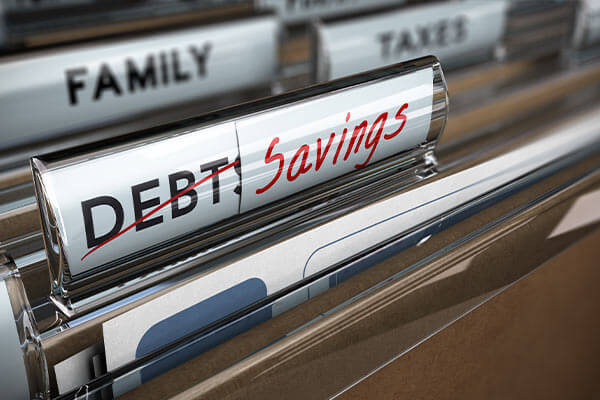How to Get Out of Debt: 5 Simple Steps
It’s easy to get into debt. Digging yourself out—not so much. And it doesn’t matter if you have so-called “good debt” (like student loans) or “bad debt” (like credit card debt from overspending), you’re going to have to deal with it either way.
It can take years, sometimes decades, to pay off debts. In the meantime, living with debt can be equal parts mental and financial burden. But it doesn’t have to be a lifetime sentence. Having a “how to get out of debt” plan to follow can help you stay on track, and there are tactics you can use to speed things up.
The 5 Steps to Getting out of Debt
Make minimum loan payments, and you may eventually pay off a car note, student loans, or mortgage. Other debts, such as credit card debt, could continue on forever unless you make a lifestyle change.
Most people have a combination of different types of debt, and they need to take a comprehensive approach to paying off their debts if they want to become debt free.
1. Know Your Numbers
As debt piles up, some people bury their head in the sand and ignore, rather than confront, their situation. It’s understandable, but not the most effective approach. If you want to get out of debt, an important first step is making a list of all your debts. Write down:
- Who you owe
- How much you owe
- The interest rate
- The payment amount
Having a clear picture of all your debts can be scary. That’s OK. It can also help you develop a strategic approach to paying and figure out the best way to get out of debt.
2. Track Your Finances
There are two keys to paying off debt: put more of your discretionary income (what’s left after you’ve paid all your necessities) toward your debt and make sure you don’t take on more debt. It’s easier said than done, as you may not have a lot of discretionary income to begin with, and sometimes an emergency strikes and you need to use a credit card or take out a loan.
However, much like starting by listing your debts can be helpful, you’ll also want to know where your overall personal finances stand. If you don’t already budget, look into budgeting software that you can connect to your financial accounts and use to track your income and expenses.
People are often surprised when they first start tracking their money. Little expenses can add up throughout the month and year, and you may find there are ways you can cut back to increase your discretionary income.
3. Make a Plan
Once you’ve listed your debts and have a basic budget, you can decide which loans to focus on first. Whenever you free up money in your budget or get a windfall gain, such as a tax refund or gift, you can put all or some of it toward your loans.
There are two popular debt-payoff strategies that you may want to consider:
- Debt avalanche: Focus on paying off the debt with the highest interest rate first. The avalanche approach can save you the most money over time.
- Debt snowball: Focus on paying off the debt with the lowest balance first and work your way up. The snowball approach can be more psychologically rewarding as you cross debts of your list quicker.
With either method, when you pay off one loan, use the money you had spent on that loan for the next loan on your list. You can use a payoff calculator to compare your debt-payoff timelines and see how much interest you’ll pay overall with either approach.
You may also want to take a mixed approach, perhaps knocking out a few small debts before focusing on the one with the highest interest rate.
4. Celebrate Your Wins
Following your plan and getting out of debt can be a long and slow process. Even if you’re excited in the beginning, staying motivated can be difficult. Create a way to celebrate financial milestones.
Some people create charts or pictures that they color in as they pay off debts to visualize their process. Others find free or inexpensive ways to make an evening a little extra special.
Also, think about why you want to pay off your debts and the feeling of freedom that can come from knowing you don’t owe anyone money. Let your goal drive you to stay focused.
5. How to Get out of Debt Fast
Lifestyle changes and financial tools can make a big difference if you want to quickly pay off all your debts. Consider implementing some of the following:
- Cut back: Increasing your discretionary income can happen in two ways—spend less or earn more. Start by considering lifestyle changes that will free up extra funds. Taken to an extreme, some people downsize into smaller homes or opt to use a bike or public transportation rather than own a vehicle. Less radical changes could be cutting out subscriptions, finding ways to cut down on grocery bills, and shopping for cheaper insurance.
- Look for discounts: You can also cut back your spending by looking for ways to save money on both your needs and wants. Review your budget, see where you spend the most money, and then think through how you might be able to cut back some of those expenses.
- Earn extra income: Taking on extra shifts, starting a new side gig, negotiating a raise, or finding a higher-paying job could all help. You’ll then be able to keep the same lifestyle while putting more money toward your loans.
- Refinance debts: If your creditworthiness has improved since you first took out a loan, you may be able to save money by refinancing. In practice, you’ll take out a new, lower-rate loan and use the money to pay off your current debts. While you’ll owe the same amount overall, you’ll pay less interest and can pay off your loans sooner.
- Look into balance transfer credit cards: Some credit cards offer new cardholders a promotional 0% interest rate on debts you transfer to the card. You may pay a 3% to 5% fee to transfer the debt, but then get to pay it down during the promotional period (which may last around nine to 21 months depending on the offer) without paying any interest.
Being strategic about getting out of debt can make a big difference in how much you repay overall and how long it takes you to pay off debts. You may also find doors open up to you along the way. For example, paying down credit card debt may quickly improve your creditworthiness, which can help you get a better rate if you want to refinance an auto loan.
Next Step—Build Wealth
As you pay off your debts, your net worth can slowly shift from negative to positive. Rather than paying interest, you can invest your money and focus on building wealth. Now, you’ll be the one benefiting from the effects of compound interest.
Quicken has made the material on this blog available for informational purposes only. Use of this website constitutes agreement to our Terms of Use and Privacy Policy. Quicken does not offer advisory or brokerage services, does not recommend the purchase or sale of any particular securities or other investments, and does not offer tax advice. For any such advice, please consult a professional.



